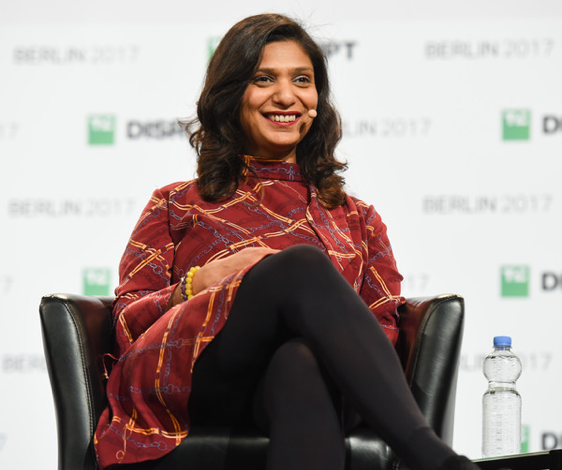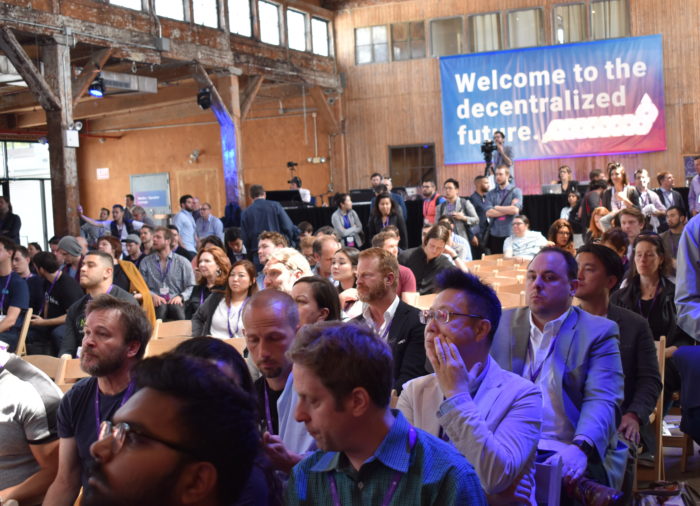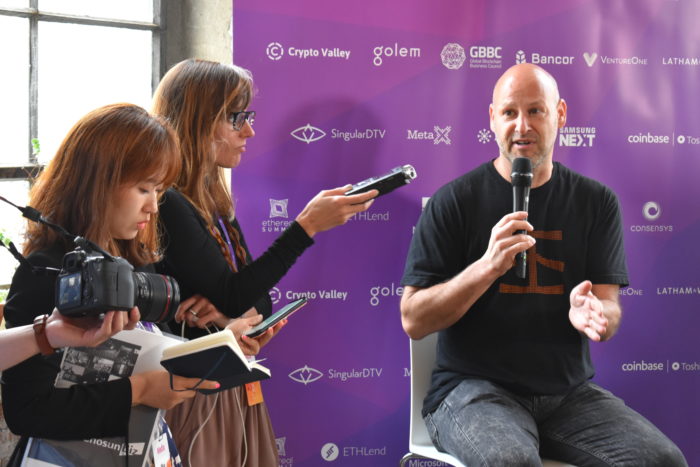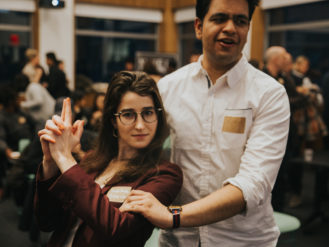A VC With $50 Million to Spend Talks About Blockchain
'It's a very new world. We are all learning,' says Kavita Gupta, the investor running Brooklyn's ConsenSys Ventures
Kavita Gupta maintains a globe-trotting schedule in search of new ideas for the Ethereum ecosystem (Photo courtesy of ConsenSys)
While the value of cryptocurrencies like Bitcoin has been notoriously volatile, the growth of mainstream interest in developing applications for the underlying blockchain technology has been much steadier. That’s why the Bushwick-based blockchain dynamo ConsenSys launched a $50 million venture fund last September, called ConsenSys Ventures, to grow the market around Ethereum, the blockchain platform it uses to develop applications.
ConsenSys has grown at a head-spinning pace, with more than 1,100 employees on six continents and 50-plus projects under way. With ConsenSys Ventures, the intent is to fund and guide promising new projects in their early days and help blockchain technology mature more rapidly. The woman chosen to run this ambitious new organization is managing partner Kavita Gupta, an alumna of MIT, McKinsey, the World Bank, HSBC, and the International Finance Corp., who most recently worked in mission-driven investing for the family foundation of Eric Schmidt, the former executive chairman of Google.
Gupta recently took an hour during a breakneck international travel schedule–that month she was in Switzerland, China, Israel and California–to talk with The Bridge about why investing in blockchain is so exhilarating, and to explain what she’s looking for when choosing new blockchain projects to fund. Excerpts:
This technology is so new. Are you learning as you go?
Ethereum is only three years old, so I don’t think anyone is an expert. Ethereum was launched in 2015, ConsenSys was founded in 2015. It’s a very new world. We are all learning. That is the exciting part of investing in it. It’s not like I’m investing in fintech and 95% to 98% of the innovation has already happened.
How do you tell what really has potential when you’re looking at entrepreneurs and companies to invest in? There’s so much hype in this industry.
Even we are figuring that out. You’re right, there’s huge buzz and it’s mostly driven by people who are trying to raise money in ICOs. The first thing we look at is, does it use blockchain? Is it the Ethereum blockchain? Is it taking the existing system to the next level using blockchain, or is this something that doesn’t really need blockchain?
After asking those questions, the team does the first call, which most of the time I’m not involved in. Then the team makes a quick judgment whether it’s something real, or not, for us. Then I jump on the second call and go deeper into the technical diligence, the financial part, the market, the time horizon.

The Ethereal Summit, run by ConsenSys, drew an estimated 2,000 attendees in May (Photo by Steve Koepp)
Can you talk about the companies you’ve invested in already?
We have launched ten portfolio companies. One example is Vault, the mobile wallet. There are lots of mobile wallets, so why were we so interested in Vault? The entrepreneurs are very strong, they’re coming from Facebook. They understand the mobile space and how the [user experience and user interface] should work. We were also attracted to it because they wanted to create a mobile wallet that is a smart mobile wallet. It works like an app store–you can attach your credit card to it and then the wallet can change between fiat and tokens.
We only work as strategic investors. [Entrepreneurs] aren’t coming to ConsenSys just to get money and move on. We have 33 global offices, and some of the most amazing Ethereum blockchain talent internally, so how can we scale companies and take them to the next level? That’s what we are interested in.
What do you think is the most exciting promise of blockchain technology?
Three things, I would say. The first is if you can have a very seamless integration of the existing technology with traditional payments systems and make blockchain just an infrastructure layer providing all the data, security, and verification benefits–so that people like my mom and dad don’t have to think about crypto or tokens or wallets–then we have a use case. It’s too complicated right now.
Secondly, the scalability. I want 10 million transactions per second as the London Stock Exchange does. And the third case is our digital payments system–people adopt it because that just makes sense. People understand that owning their data and monetizing data based on our needs has become the standard. So instead of Google and Amazon creating their own private blockchain and asking that we’re centralized, we move in a way so that private and public channels exist so that people own their own data. Then we’ve delivered the real use case of blockchain on a massive scale.
You hear people talking about how blockchain will disrupt Google and Facebook and they won’t be able to just take your information anymore. Can you talk about how that will work? Does that mean I won’t use Google or be on Facebook anymore?
We get tons of people pitching things like Airbnb on blockchain, Google on blockchain. That’s great, but do we really need it? Do we need to take everything and start all over again?
I don’t have a company that I’ve invested in that does this yet, but I envision that there will be an API that will basically give me a local node on my laptop or computer. When I go to Google or Amazon, I’ll go through that node, which will block my private information from being extracted without my permission. So Amazon, instead of taking all my information, will give me a pop-up window saying, “Are you OK to give me this information?” If I say no, I should still be able to access their services and order products.
Over time, sovereign identity platforms like uPort will provide me blockchain identity, and that blockchain identity is smart enough to give Google and Amazon the information which I’m comfortable with and which are needed. I understand that Google needs to understand that this is my name and I’m from California, my age, for customizing my preferences, but it shouldn’t be externally monetized without my permission.
But aren’t those services made better through personalization? Or is the idea more that they will reimburse me if I give them that information?
Yeah, they will monetize that. They will ask me if they can take that information and this is the cost of it. Right now, there is no disclosure. I have no idea what is being taken or how it is being used. With blockchain we are creating a check and balance. I don’t believe we have to remake the whole world. I like using Google, I love Facebook, I like Amazon. But if I can have an extra layer in the middle which looks after me, then that’s what I’m looking for.
Did you see the tongue-in-cheek piece called 187 Things The Blockchain Is Supposed To Fix? It feels like people are trying and failing to identify real innovation in this space. How do you know what’s real and what’s vapor?
The way I look at it is, use cases are still emerging. The blockchain industry is still really young and new. We still don’t have scalability. If I’m an online shop, I can’t use blockchain for payments because it can’t handle my volume. I want to focus on infrastructure, on scalability, on creating liquidity, then going back into applications. Because many applications are useless right now. The scalability won’t happen on the applications if we don’t fix sharing, staking, or various ways to achieve it like state channels.

Joseph Lubin, founder of ConsenSys, took questions from the press at the Ethereal Summit (Photo by Steve Koepp)
So what projects are you putting your energy into, then?
We are dividing our time. We are doing security products. And we are doing applications, if they make sense. DADA [a digital art-collecting site] is a perfect example. Its non-fungible token makes sure the artists are verified for the life of that particular art piece, and it makes sure that every time the art is sold, the artist knows where his piece of art is. And it tracks the financial transactions, which is very important for any industry.
In this sector this application makes sense because you’re not doing 5,000 transactions per second for art collectibles. Ujo, a music application which is a very similar use case, also makes sense. Supply chain makes sense because you can do the traceability for any transaction.
But then when you say, “Oh, I’m going to create a payment layer system for the exchanges,” great. You can show the use case, but what are you going to do beyond that? That’s why you’re not seeing blockchain payment systems in the Macy’s of the world, because the infrastructure is not there.
How many years away is something like that, when blockchain is a common technology that all companies are using?
I think that a lot of applications will start hitting in Q4 2018 and Q1 next year, things like sovereign identity and smart wallets. There are a lot of substantial movements in the space. I think by December 2019, we should be at least 50/50 there, and by 2020, 2021 this will be a really mature technology.
Who are the people working in blockchain who you admire the most? Who are the Jeff Bezos or the Steve Jobs of blockchain?
First, Vitalik [Buterin], I really look up to him. Second, Joseph Lubin [founder and CEO of ConsenSys]. I don’t think people would have realized the power of blockchain and Ethereum without Joe putting ConsenSys on the map. He put all his money, trust, and faith into getting all of us to start building this crazy, international company in three years, and putting so many projects out. Third, Plasma founder Joseph Poon. His project is really amazing. And Karl Floersch from Casper; I’ve been following a lot of his work.
How are you thinking about regulatory concerns? In the U.S. it feels like regulations are far behind.
The U.S. just decided that ether is not a security, which is a really really big relief. If you would have asked me this question four or six months back, I would have said I really wanted to speak to my legal team [before answering]! It is becoming more mature; I have way more clarity now than I did in September of last year.
This market is evolving so much; we still need guidance from them, like, GAAP does not have an accounting to tell us what is the right way to determine the valuation of a company. We are doing the best we can understand by providing all the disclosures to the [Securities and Exchange Commission], but there is no set-in-stone method. Legal, accounting, valuation, investment holdings … this will evolve over the next year or two.
What can you tell me about ConsenSys’s accelerator program?
We realized two gaps. We wanted people who are moving from traditional world to blockchain world to really understand what already exists. We were getting a lot of pitches from really smart people at Facebook or Google or Uber who were reinventing decentralized apps for products that already exist. We wanted to bring blockchain 101 to the entire ecosystem, then we move into a place where you understand the basic tools and products that are already available.
Secondly, we want to bring a lot of international products to the U.S. We got a lot of applications from China, Israel, India, Russia, and that is super exciting. There are always international projects that are not ready for venture funding. But maybe we really believe in the idea or the project runners, but they need a lot of ecosystem support. This is our way to get them absorbed very early on.
How are people in this business educating Washington about what needs to be done?
ConsenSys’s legal team is working with the founder of Open Law, Aaron Wright. They have been talking with SEC very closely and collaborating with them. Open Law and The Brooklyn Project are two projects with ConsenSys with some really amazing lawyers who have been helping to keep us all out of jail! [Laughs.]
What do you think about the blockchain community in Brooklyn and New York as it compares to other cities around the world?
New York took a liking to blockchain much earlier than San Francisco, and that continues today. I see a lot of amazing companies coming out of New York. Vault and DADA are both out of New York. We definitely have more companies based out of New York than San Francisco.
How about places like Zug, Switzerland, or Singapore–is Brooklyn on that level as far as the blockchain ecosystem goes?
No. [Laughs.] In the U.S., New York is very ahead. But internationally, China and Singapore are crazy. I mean, blockchain is just the technology everyone talks about. They’re very much into mining, tokens, and trading, those are all buzzwords around there. I was in Shanghai last week and was talking to my colleagues in the car, and the driver said, “I have Bitcoin!” And he didn’t speak English, but he knew Bitcoin.













